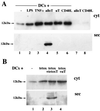Antigen-presenting dendritic cells provide the reducing extracellular microenvironment required for T lymphocyte activation
- PMID: 11792859
- PMCID: PMC122218
- DOI: 10.1073/pnas.022630299
Antigen-presenting dendritic cells provide the reducing extracellular microenvironment required for T lymphocyte activation
Abstract
T lymphocytes are defective in cystine uptake and thus require exogenous thiols for activation and function. Here we show that monocyte-derived human dendritic cells (DCs) release cysteine in the extracellular space. Cysteine generation is increased by lipopolysaccharide and tumor necrosis factor alpha, and by contact with T cells specifically recognizing soluble or alloantigens. These stimuli also induce thioredoxin (TRX) accumulation in DCs. However, only the contact with antigen-specific T cells triggers TRX secretion by the antigen-presenting cells. Fewer extracellular thiols are recovered after DC-T cell interactions when cystine uptake or TRX activity are inhibited. In addition, glutamate (Glu) and anti-TRX-inactivating antibodies inhibit antigen-dependent T lymphocyte proliferation. These findings indicate that, during antigen presentation, DCs uptake cystine and release cysteine and TRX, thus providing a reducing microenvironment that facilitates immune response.
Figures





Comment in
-
Antigen-presenting cells control T cell proliferation by regulating amino acid availability.Proc Natl Acad Sci U S A. 2002 Feb 5;99(3):1107-9. doi: 10.1073/pnas.042707999. Proc Natl Acad Sci U S A. 2002. PMID: 11830651 Free PMC article. Review. No abstract available.
References
Publication types
MeSH terms
Substances
LinkOut - more resources
Full Text Sources
Other Literature Sources

